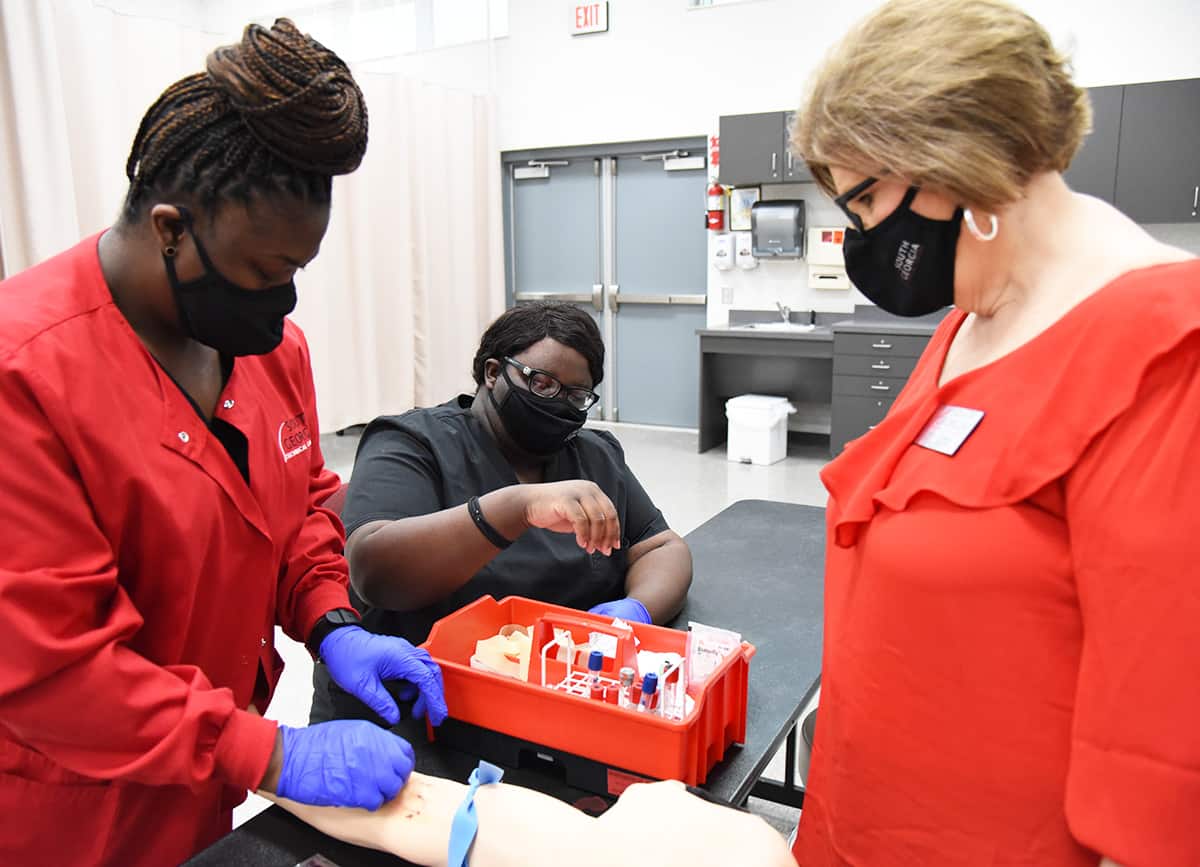Phlebotomy Courses Near Me: Which One Is Best?
Wiki Article
Discovering the Crucial Skills Gained From a Phlebotomy Educating Training Course for Aspiring Professionals
In a phlebotomy training course, you'll get important skills that go past just attracting blood. You'll grasp venipuncture strategies and discover the importance of security procedures. You'll also create the capacity to engage successfully with patients, which can reduce their anxiousness. However there's more to it-- recognizing composition and managing lab devices are just the start. What various other essential skills can you anticipate to get as you get ready for a career in this area?Recognizing Venipuncture Techniques
Grasping venipuncture strategies is important for anybody going after a profession in phlebotomy. You'll require to establish a solid understanding of just how to find blood vessels efficiently. Start by exercising palpation abilities to really feel for the best places, usually in the antecubital fossa - Phlebotomy school. It's everything about being confident and gentle while taking care of people.You must acquaint yourself with the various needle sizes and kinds, as picking the appropriate one can make a distinction in convenience and effectiveness. During the treatment, you'll discover to clean the website properly to minimize infection risks.
Exercising the actual draw will certainly assist you understand the relevance of angling the needle properly to access the blood vessel without causing unnecessary discomfort. By fine-tuning these skills, you'll not just obtain the trust of your people yet likewise guarantee effective blood attracts, making you a skillful phlebotomist all set for the demands of the work.
Mastering Safety And Security Protocols
As you excellent your venipuncture methods, it's equally essential to focus on safety and security procedures to protect both yourself and your individuals. Familiarize yourself with infection control actions, like correct hand health and the usage of personal safety devices (PPE) Constantly put on gloves when managing blood examples, and transform them in between patients to decrease contamination threat.You should likewise recognize just how to deal with and get rid of sharps safely. Use assigned sharps containers and follow local standards for biohazard waste disposal. Understanding these procedures not only keeps you risk-free however also assures your clients.
In addition, remain updated on emergency situation treatments, like what to do in case of a needle stick injury or a negative response (Phlebotomy school). Regular training and refreshers on safety procedures will certainly improve your self-confidence and guarantee you're constantly prepared. By mastering these precaution, you contribute to a more secure healthcare environment for everybody involved
Establishing Individual Communication Abilities
In phlebotomy, constructing rapport with patients is essential for a favorable experience. You'll need reliable interaction techniques to help relieve their issues and manage any kind of stress and anxiety they may really feel. By concentrating on these skills, you can develop a more comfy setting for both you and your people.Building Rapport With Sufferers
Building rapport with individuals is vital for reliable phlebotomy method. When you develop a connection, patients really feel more comfortable and secure throughout procedures. Start by welcoming them warmly, making eye contact, and using their name. Program authentic interest in their health and listen proactively to their worries. This strategy assists to alleviate anxiety and constructs trust fund. Remember, your body language plays an essential role; keep an open posture and smile to strengthen your friendliness. Share a quick, comforting description of the procedure to help debunk the process. By focusing on rapport, you not only enhance the individual experience yet also enhance the precision of your job, ensuring that they're unwinded and participating throughout blood draws.Effective Communication Techniques
Efficient interaction strategies are important in phlebotomy, since they aid you connect with individuals and assure a smoother experience. To develop your client communication abilities, focus on making use of clear and concise language. Always present yourself and clarify your role, making certain clients really feel comfortable and informed. Actively pay attention to their problems and concerns, as this reveals you value their input.Be empathetic and person, particularly with those that may be distressed concerning the procedure. Practicing these strategies will certainly improve your ability to engage with clients successfully and develop a favorable ambience during their sees.
Taking Care Of Client Anxiety
While it's all-natural for people to really feel distressed regarding blood draws, you can play Phlebotomy school a necessary function in easing their concerns. You can additionally use distractions, like talking concerning light subjects or providing an anxiety ball to press. Warranty they're comfy and sustained throughout the process, as a positive communication can significantly minimize their anxiety and foster count on in your skills as a phlebotomist.Understanding Makeup and Physiology
Understanding makeup and physiology is important for mastering phlebotomy abilities, as it assists you understand the body's structure and functions. You'll find out about the circulatory system, consisting of capillary, arteries, and blood vessels, which is crucial for locating veins during blood attracts. Familiarizing yourself with the numerous sorts of blood cells and their functions will certainly improve your ability to explain procedures to individuals and comprehend examination results.Furthermore, comprehending the relevance of various physiological spots will make you a lot more efficient in determining the most effective websites for venipuncture. You'll additionally check out exactly how the body reacts to injury and the healing procedure, which can notify your method.
Taking Care Of Research Laboratory Tools
Handling research laboratory tools is crucial for ensuring precise outcomes and a risk-free working atmosphere. You need to remain on top of maintenance strategies and follow security protocols to stop crashes. By prioritizing these techniques, you'll enhance your efficiency as a phlebotomist and shield both yourself and your people.Devices Upkeep Techniques
Correct maintenance of research laboratory equipment is important for guaranteeing exact test results and the safety of both people and personnel. To keep your tools in leading shape, begin by cleansing it routinely. Clean down surfaces and elements to avoid contamination and wear. Look for any kind of indicators of damage or malfunction, and address these issues immediately. Adjust your devices according to the manufacturer's guidelines to preserve accuracy. In addition, preserve a log of upkeep tasks and assessments to track efficiency in time. Determine all materials, like needles and tubes, are kept effectively to extend their lifespan. By developing a routine for devices treatment, you'll improve dependability and performance in your lab techniques.Safety And Security Procedures in Labs
While it is vital to keep laboratory tools, adhering to safety and security protocols is equally important to shield everybody in the laboratory. Always put on appropriate personal safety devices (PPE), like handwear covers and safety glasses, to reduce direct exposure to dangerous materials. Familiarize yourself with the place of security devices, such as eyewash terminals and fire extinguishers, guaranteeing they're accessible. Properly tag and store all chemicals to stop mishaps and mix-ups. When utilizing sharp tools, manage them meticulously and dispose of them in assigned containers. Keep your workspace organized to decrease the threat of spills or injuries. Regularly examine equipment for any indicators of wear or breakdown, and report issues instantly. By complying with these protocols, you add to a more secure setting for everybody involved.Carrying Out High Quality Control Steps
Applying quality control actions is important for ensuring the precision and integrity of phlebotomy practices. You need to routinely adjust and maintain your equipment, as also small disparities can lead to significant mistakes in results.Conducting routine audits of your procedures can highlight locations requiring improvement and strengthen finest methods. You should likewise participate in recurring training to remain upgraded on the most current strategies and modern technologies in the field. Encouraging feedback from colleagues can develop a culture of team effort, where everybody is invested in keeping top quality standards. By focusing on quality assurance, you not just boost your very own abilities however likewise add to much better patient outcomes and the total stability of the health care system.
Browsing Legal and Ethical Factors To Consider
You'll need to familiarize yourself with laws regarding patient permission, privacy, and handling of biological materials. Always make sure you have actually informed approval from individuals before performing any type of procedures.Fairly, you ought to appreciate patient privacy and preserve confidentiality at all times. Understand the Health Insurance Coverage Mobility and Liability Act (HIPAA) guidelines, which govern the handling of delicate wellness information.
Additionally, stay upgraded on your facility's policies and treatments to guarantee compliance with local regulations and standards. When in question, consult your manager or lawful resources - Phlebotomy Training Course. By focusing on these legal and ethical elements, you'll foster a secure environment for patients and copyright the integrity of your career
Frequently Asked Questions
What Occupation Opportunities Are Offered After Finishing Phlebotomy Educating?
After completing phlebotomy training, you can pursue career chances as a phlebotomist in healthcare facilities, centers, blood contribution centers, or research laboratories. You could additionally consider duties in study or clinical helping, broadening your expert perspectives.How much time Does a Typical Phlebotomy Educating Course Last?

Is Qualification Needed to Function as a Phlebotomist?
Yes, qualification is typically called for to function as a phlebotomist. It demonstrates your abilities and expertise, making you extra competitive in the work market. Companies usually prefer certified prospects for these placements.What Are the Costs Related To Phlebotomy Training Programs?
Phlebotomy training programs commonly set you back between $700 to $3,000, depending on the organization and location. You'll additionally require to spending plan for textbooks, materials, and qualification test charges, which can include in your overall costs.Can Phlebotomy Training Be Completed Online?

Report this wiki page